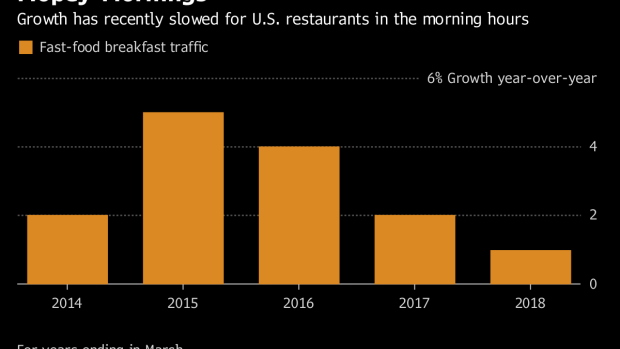Jun 14, 2018
With Breakfast Push Struggling, Subway Backs Off of Early Shift
, Bloomberg News

(Bloomberg) -- Eggs are going by the wayside at Subway Restaurants.
Eight years after jumping into the U.S. breakfast market with omelet sandwiches and a mandatory 7 a.m. start time, the chain is quietly allowing franchisees to opt out. That’s because relentless competition has eaten into profit margins, and the menu items have failed to catch on in some locations. A labor shortage, meanwhile, has restaurant owners struggling to find enough workers to staff the early hours.
The 2010 initiative to offer breakfast sandwiches (which today cost about $4 to $6) and Seattle’s Best coffee came at a moment when Subway was still expanding aggressively in the U.S. Its restaurant count swelled to more than 27,000 in 2015, but has fallen since then. The company plans to close as many as 500 locations this year.
Subway has gradually eased up on franchisee’s breakfast requirements over the last year, according to documents from Subway’s North American franchisee association.
According to a recent survey by the market-research firm Field Agent, 43 percent of Subway customers said they don’t eat at the chain for breakfast and 19 percent weren’t even aware it offered the meal. And 67 percent said it wouldn’t affect their Subway eating habits at all if the company stopped offering it, according to the study, which surveyed diners on June 12 and 13.
‘Exceptional’ Experience
Subway is making changes “as needed to help Subway franchisees be more successful,” James Walker, the chain’s vice president for North America, said in an emailed statement. “Each Subway location and customer base is unique, and our goal is to provide franchisees with the resources to deliver an exceptional guest experience while running a profitable business.”
The company is searching for a new chief executive officer as Suzanne Greco, who took over after her brother died in 2015, steps down at the end of this month. Her brother, Fred DeLuca, was co-founder of the company.
Subway is not the only chain struggling to turn a profit in the early hours of the day. Breakfast growth has slowed in recent years for U.S. fast-service restaurants, according to NPD Group data. In the year ended in March, breakfast visits were up just 1 percent, compared to 5 percent growth three years ago, the data show.
“Breakfast is really hard to compete in,” said Jennifer Bartashus, a Bloomberg Intelligence analyst. “Changing consumer behavior during breakfast time -- which is the most ritualistic -- is much harder than a lot of chains expect it to be.”
Starbucks, Taco Bell
Since its introduction, Subway’s breakfast push has been hit by competition from all sides. Taco Bell in 2014 began selling waffle tacos to compete more heavily with McDonald’s Corp. The Yum! Brands Inc.-owned chain now sells breakfast burritos for $1.69, $1 hash browns and bacon-and-egg crunchwraps for $2.99.
At the same time, Starbucks Corp. has boosted its food offering with items such as two sous vide egg bites for $4.45 and Greek yogurt bowls with chia seeds for $5.25.
To be sure, many Subways will continue opening early -- in Chicago, a location in the Loop opens at 6 a.m. to hawk 6-inch and footlong flat-bread egg sandwiches to commuters. The restaurant, across the street from a Starbucks and next to a Dunkin’ Donuts, also has hash browns for $1.
Nearby, 30-year-old insurance analyst Libby Vasquez said she would prefer to grab an egg-and-bacon sandwich from Potbelly Corp. or bring something from home over buying breakfast at Subway.
“We go there for lunch a lot, but not breakfast,” Vasquez said.
To contact the reporter on this story: Leslie Patton in Chicago at lpatton5@bloomberg.net
To contact the editors responsible for this story: Anne Riley Moffat at ariley17@bloomberg.net, Jonathan Roeder, Kevin Miller
©2018 Bloomberg L.P.